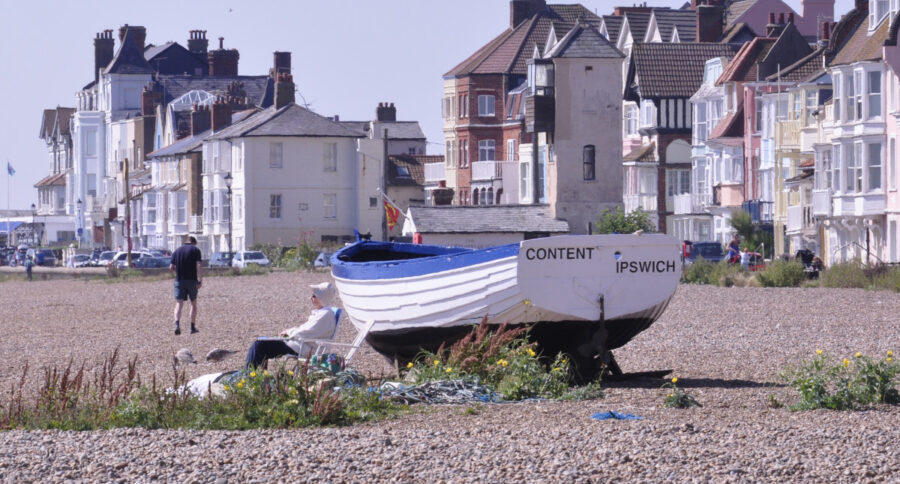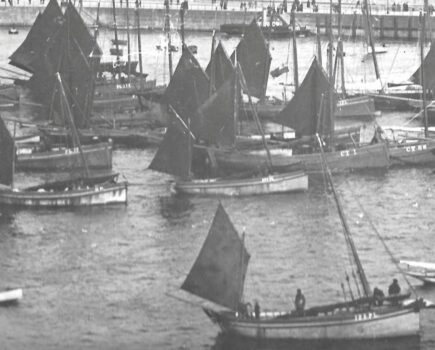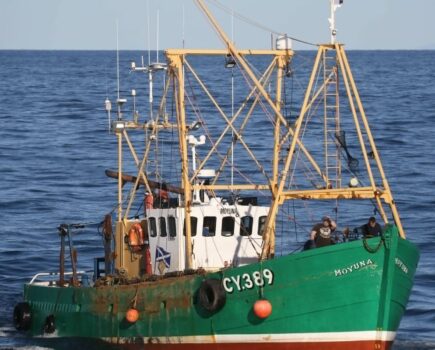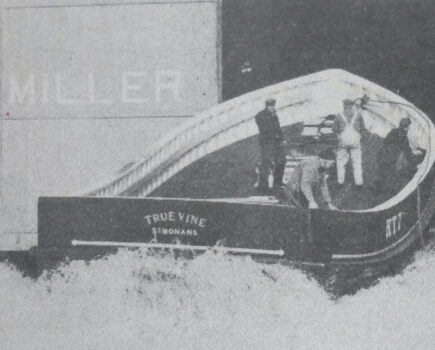The Suffolk inshore fleet is struggling – but it shouldn’t be. John Worrall reports
It’s all a bit depressing. The Brexit threshold has been crossed and fishing, like everything else, is in transition. Whatever horse deals are being done in the wider scheme of things, and however much fishing is being batted back and forth as – to mix the metaphor – the feared bargaining chip, the end result will be better than the old regime – won’t it?
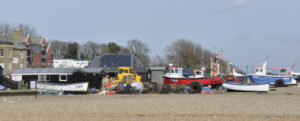
Boats and sheds and shops on the beach at Aldeburgh – the tourists love them…
Well, first of all, for the inshore fleet on the Suffolk coast, it couldn’t be much worse. The industry here has so far survived against the odds, but the odds are still building. This coast – now down to three or four dozen boats, almost all ultra-low-impact under-10s – has seen fishing opportunity steadily eroded to the point where, looked at as a new proposition with start-up costs, it would never be viable.
One irony is that there is a lot of fishing history hereabouts, not least at Lowestoft, which was huge at the peak of the herring fishery of the late 19th and early 20th centuries. But there were also the small ports and beach-launching places where small boats chased different species at different times of the year, working the seasons with pots and nets and lines, and earning and spending in local economies, and giving work opportunity to local lads who cemented the communities together.
But all of that has shrivelled, any work opportunity for a new generation of local lads more or less evaporated. That’s partly because, confronted with science that suggests depletion of this or that stock, regulators apply restrictions, and by far the easiest fishing sector to restrict is the inshore fleet. By local observation, that science seems constantly three to five years behind the curve – but then, proper science takes time and, more particularly, money, which is rarely enough or in time.
The restrictions ignore the low impact of the inshore fleet, while beamers churn up and down this shallow sea, and likewise the occasional 7,000-plus-tonne supertrawler claiming zero by-catch and, for that matter, electric pulse trawlers – almost all Dutch – which, for years, electrocuted waters up to the 55th parallel while stripping out sole, on which they are particularly effective.
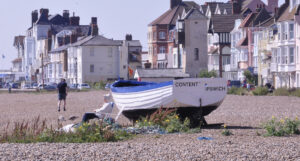
… including the now superannuated open boats, which until the 1980s were each supporting two jobs.
Pulsing, at least, is being phased out after sustained outcry from all sides, not least from the scientists, who for a long time were ignored by the EU commissioner, as was the European parliament when, in January 2018, it voted by a big majority for a ban. Only the following year, with his term coming to its end, did commissioner Karmenu Vella bend to pressure and the threat of legal action from French NGO BLOOM.
Part of the problem for this east coast inshore fleet is the small number of finfish species available, compared, say, to the west side of the country. Options come down to cod, sole and skate, along with non-quota bass. There is also herring, but at 40p a kilo, you need tonnes – and two or three crew – for which an U10 is not the ideal platform. Once upon a time there was spurdog, but there is now a complete ban, notwithstanding the fact that there are so many that the longliners can’t avoid them.
There was, of course, the helpful contribution a year or two back from local MP Thérèse Coffey, then a DEFRA minister, who suggested, Marie Antoinette-like, that fishermen could catch haddock instead. No one has seen a haddock this far down the North Sea since early last century.
Of those available few species, cod, the winter liners’ traditional main option, has moved north as the seas have warmed, while skate isn’t worth much, and the sole stock has been looted by those pulsers. Bass, for its part, is heavily restricted, with a closed season of February and March, and only otherwise available to those with entitlement. After that, there’s crabs and lobsters, and also whelks, to which a lot of boats have turned in search of any sort of return.
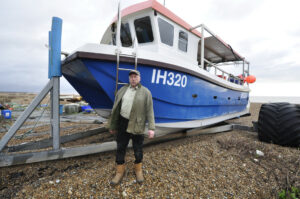
Kirk Stribbling missed out on a full bass entitlement because he sold his bass through his shop.
But the bass situation continues to rankle. Driven originally by advice from ICES in 2016 that stocks might be under pressure – although close study of the basis for that advice showed that it didn’t actually have much idea of how much bass there was, and so the default position had to be the precautionary principle – the MMO produced the bass entitlement system. Entitlements were granted only to those boats with proven gear-specific bass track record between 1 July, 2015 and 30 September, 2016. That straightaway excluded boats whose catches had been sold direct to the public or to restaurants, because such sales, not having to be registered, did not create track record.
So down at Aldeburgh, where fishermen have always sold direct to the public from their sheds on the beach, becoming a major visitor attraction in the process, there was no automatic track record.
Kirk Stribbling fell partly foul of that. He works his catamaran Enterprise IH 320 from Aldeburgh beach, and sells direct.
“I’m not allowed to catch bass on longlines because I had no track record with that method. I can only get them as by-catch on fixed nets, and that has devalued my licence. With no cod about as well, it’s not viable for me to go longlining, and yet the MMO has always deemed that method to be environmentally friendly and sustainable. The only way we can see a future in fisheries is to scrap the MMO in favour of an industry-led organisation that prioritises local fishing communities. The MMO should be judged on its own track record of ever-decreasing stocks, quota and fishermen.
“And then, of course, we have Sizewell C coming up right on our doorstep, which will be a big intrusion for local boats – and then more and more wind farm cables reducing the grounds we can work. I can’t offer a youngster a job. I can’t pay a living wage, because I can’t get a wage out of it myself. I’m 60 now, and luckily, I don’t have a mortgage on my boat or house. If I had, I couldn’t be doing this.”
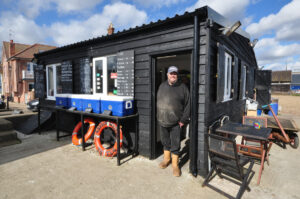
Allan Wood also sold bass through his shop, but a single tagged fish he sent to CEFAS was enough to give him track record and a full entitlement…
Just along the Aldeburgh beach, Allan Wood works his monohull Reuben William IH 212 with crewman Nuggy Burns. He also has a shop, and has always sold a lot of his fish direct to the public, including bass. But fortunately for him, during that critical track record period, he happened to catch a tagged bass, which he sent to CEFAS up the road in Lowestoft, and they had a record of it, which was enough to get him an entitlement. That’s how arbitrary the system is.
He’s setting pots for crabs until June when they start moulting, and then it will be lobsters. But alongside all that, the main thing is netting.
“We just need more quota. We can’t land spurdog, and it’s scandalous the way they are treating us about catching a few bass. We’ve got loads of sole quota, but that’s because so many boats have gone after whelks. I was looking at Fishing News from 10 years ago, and we had 150kg for this month. We’ve got 4t at the minute because so many boats are whelking, but if that fishery were to fail – because perhaps coronavirus kills that market – and they all went back to sole, quota would be short again.”
But at least the stocks might be building again, now that the pulsers are phasing out.
“We saw enormous numbers of juvenile sole coming up last year, and so 2022 or 2023 might be okay. There are also one or two codling about, and so maybe there’ll even be a small spring run now.”
There aren’t such encouraging signs yet down Orford way, where Bill Pinney has U10 catamarans Jolene LT 1020 and Southern Cross LT 1032 working from Butley Creek, one skippered by his son. Lining is the winter game, but there are no cod.
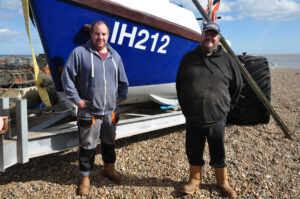
… so Allan is able to have a crew – Nuggy Burns.
“We can’t even bait up for cod because there aren’t enough around, and so we bait up with herring for thornbacks. They are the only rays we get down here, but they’re very low-value because conservation organisations bracket all skates and rays together, and some are depleted – though not thornbacks – and so supermarkets no longer buy them, and big catering establishments, like Cambridge colleges, have been banned from using them.
“We’re seeing a fraction of the soles because of the pulse beamers. Once upon a time, we were getting 40-50 stone a day at peak. Now we’re getting four or five. It’s gone down by a factor of 10. At present, it’s not viable. But although pulsing is being phased out, we don’t want it replaced by heavy beamers.
“We get a few bass on lines at certain times, but they’re a bonus, and we can’t land them anyway in February and March. And we can’t land spurdog at all. It’s frustrating about spurdogs, because there is a massive amount off here. We have to stay clear, or we get one on every hook. We just totally waste our day, because it’s a very difficult day’s work putting them back.
“What we really need is for regulators to understand how few species we have, and how restrictions on any of them drastically reduce the chances of fishing being viable. Longlining ticks all the boxes for sustainability – small-scale, hand-baiting – and is eminently controllable in terms of effort. It’s treated differently in the South West, where netters are allowed 100t by-catch, even though they catch them by a less sustainable method, where they bring aboard dead fish. So they are allowed to land 100t of spurdog dead, and we can’t land any at all, and are penalised for our ability to put small fish back alive.
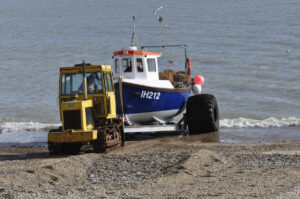
Launching on Aldeburgh’s shingle needs tracks and big tyres.
“It flies in the face of the scientific recommendations, because ICES has said that the spurdog stock can withstand 2,000t or more in the northeast Atlantic, and yet it has still banned it everywhere, except for this 100t it has given to the netters in the South West.”
Meanwhile, back up the coast at Sizewell, Noel Cattermole has worked from the beach for nearly 50 years. His boat, Joseph William IH 89, is the only commercial survivor there now. He uses nets and longlines, and over the years has sold a lot direct from his house just off the beach, although these days he puts more through the markets so that he’s less tied down. Sole was a big number for him, until that was hammered by the pulsers. He sets pots in the summer, but he does have a bass entitlement, and that’s now his main thing.
“It’s a good seller, which is why it’s real hardship at this time of year with the two months’ close season. And there isn’t much trade with the holidaymakers in January, February and March either. If there was cod, we’d catch it. Sometimes there’s skate and herring, but they’re worth no money at all.”
There’s also the prospect of the development of Sizewell C, but he isn’t overly concerned. “The power station people have been good neighbours. They’ll be dredging and bringing boats in during the construction period, and they know where I fish, because they have it all logged. Hopefully we’ll agree compensation for the 10 or 12 years of building, and I won’t be fishing here after that anyway.
“Our worst threat at the moment is all the wind farms that want to use this area; cables laid by the first ones have already developed freespans which you can’t fish over. And it seems that more and more projects are being given permission, resulting in more fishing areas lost. Fishing for a living is becoming unviable. Things have become a real struggle, with narrowing options.
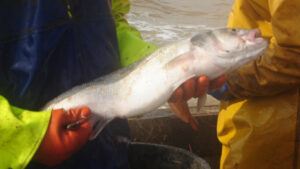
A few bass make a lot of difference.
“Everything seems to be against us these days. I don’t mind the hard work, and I don’t mind not catching much at times, because there’s nothing more sustainable than fishing from the same spot – low food miles, short times at sea, light gear, all in one small area.
“But the hardest thing is the mental side of it now. I’ve never known the east coast fleet so demoralised. The state of the industry is awful.”
Further up, at Southwold, Richard Burrell works the U10 Avril Rose LT 16, one of a dozen or so boats working from the river Blyth.
“We’ve got no cod, heaps of spurdog which we can’t land, and skate which are worthless. And we can’t catch bass this time of year. We used to rely on cod, but have seen hardly any this winter – but, again, plenty of spurdog.
“In the past, you might be fishing steady on cod and then they would disappear, and a couple of days later, a heap of spurdog would turn up. And then we would go fishing for them, which was always good. But now the sea is absolutely alive with spurdog, but we aren’t allowed to catch them, and there are no cod.
“They’ve got to open up the spurdog fishery. It’s been proved time and again, by anyone who’s gone lining, how many there are. They are not endangered. They are four to six feet long and thick round. One on every hook, sometimes.”
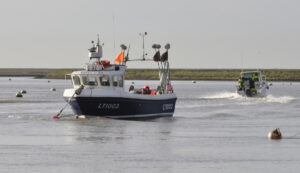
Four boats work from Orford, two of them from the river near the quay, and Bill Pinney’s two, which work from Butley Creek.
Oh, and in the summer, there are mackerel. “But we’ve got a 30cm minimum landing size, whereas on the south coast it’s 20cm; 90% of ours are just under 30cm. If we were able to land them as they can down south, they’d make good money on the market, especially hand-caught with feathers.”
And, of course, the bass. “Everyone was drift-netting for them until they got stopped, which is the best way to catch them. The nets aren’t in the water for long, and the fish come up in good condition, as good as any line-caught fish. But if you land a bass out of a net on the bottom overnight, he’s knocked about. A dead fish is a dead fish, but why is it not allowed to land a better one?”
But new avenues sometimes open up. Last year, he pulled up a couple of human skulls, and landed them because of the discards ban. They were old ones, and the police weren’t interested. And then he caught a monkfish, the first he’d ever seen. And as he was putting it back, it bit him. Life gets tedious.
All along this coast and beyond, there is talk of the low ebb of relations between an increasingly demoralised industry and the MMO. The infamous Catch App certainly hasn’t helped, but it goes wider than that. There is now a very entrenched ‘them and us’ atmosphere where, in a system where rule changes are posted almost daily, the stress for fishermen of wondering if they are doing something wrong has taken the joy out of the job. ‘Ex-coppers looking for criminals’ comes up a lot, with stories of some boats getting more attention than others because they come in at predictable and convenient times. When there aren’t many boats anyway, that becomes even more burdensome.
Fair enough, rules are rules and they have to be observed, and the fishing life is nowhere near as simple as it was even a generation ago. But there is also the Regulators’ Code, introduced by the government in April 2014, to improve the way regulation – in all business sectors – is delivered. Point 1 requires regulators to ‘carry out their activities in a way that supports those they regulate to comply and grow’. There isn’t much evidence here of growth encouragement – the reverse, more like, they say – nor, for that matter, of acknowledgement of the code generally.
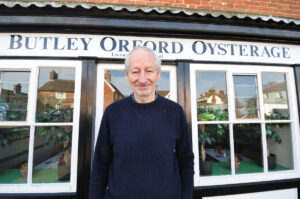
Bill also does oysters, but that’s another story.
Much of the friction and stress hinges on quota, and the risk of landing more than the permitted allowance – something that is not such a pressing issue with sector boats, whose PO can arrange quota leasing or cross-booking. Most U10s, not being in a PO, are on their own, with no organisational back-up to give such flexibility.
But that may change. The Coastal PO was recognised as a PO by the MMO in 2017, and although the MMO has not yet given the Coastal PO’s members PO licences – which would allow the Coastal PO to manage its members’ fishing opportunities as other POs can do for their members – the MMO and the Coastal PO have now agreed terms for a pilot scheme, which can start as soon as the MMO gives final permission. Not only would sorting something out on that front lift a considerable burden from a demoralised fleet, it would be a major and much-needed PR boost for the MMO.
Because in the end, much of this fishery is about small boats fishing close in, and in many cases selling direct to the public. It’s the lowest of low impacts, it provides more jobs per tonne landed than any damaging beamer, and the tourists – the main spenders on this coast – love to see it. If fishing were to survive and grow, as part of the commercial core of these coastal communities, and provide year-round work in an otherwise very seasonal economy, it would rebuild resilience which in past decades has been steadily eroded – not just in East Anglia, but in coastal communities around the country.
But Suffolk fishing is also about Lowestoft, where fishing history runs deep, and where the fishmarket could be the fulcrum upon which East Anglia’s fishing future turns; more opportunity would mean more fish than could probably be sold from those sheds on the beach. There is the REAF – Renaissance of East Anglian Fisheries – initiative, which was founded in an attempt to devise a strategy for a way forward, and to which Fishing News will return shortly – but that way forward depends a lot on what comes out of the new agreement with Europe, and the degree of control of the southern North Sea that is actually repatriated, and, in turn, whether bigger boats will also then be landing to this main port.
And right now, with coronavirus spreading exponentially and consuming nearly all political oxygen, and with Europe more or less locked down for the foreseeable future, there probably won’t be many indicators on that front for a while.
It’s all a bit depressing.

